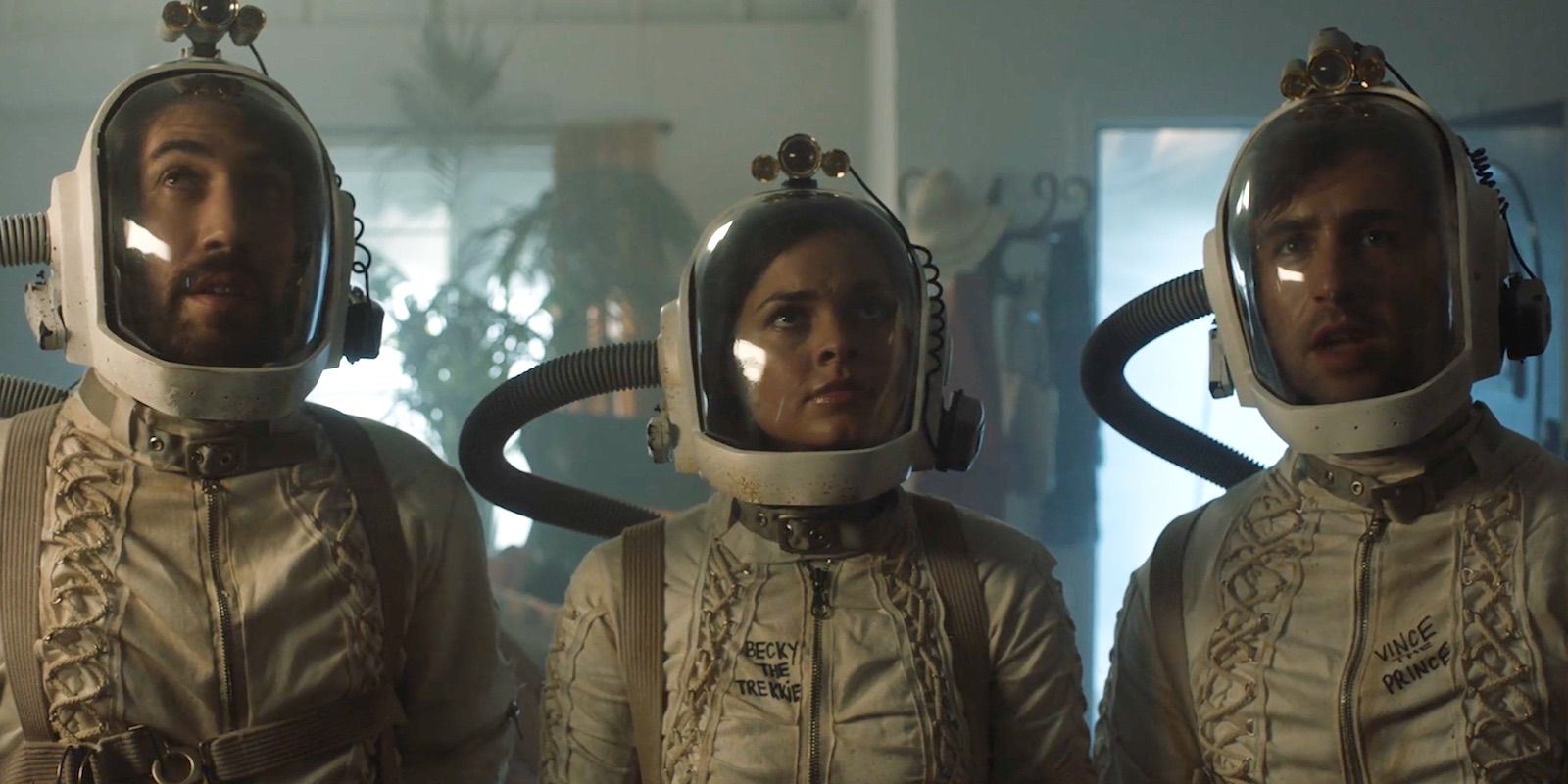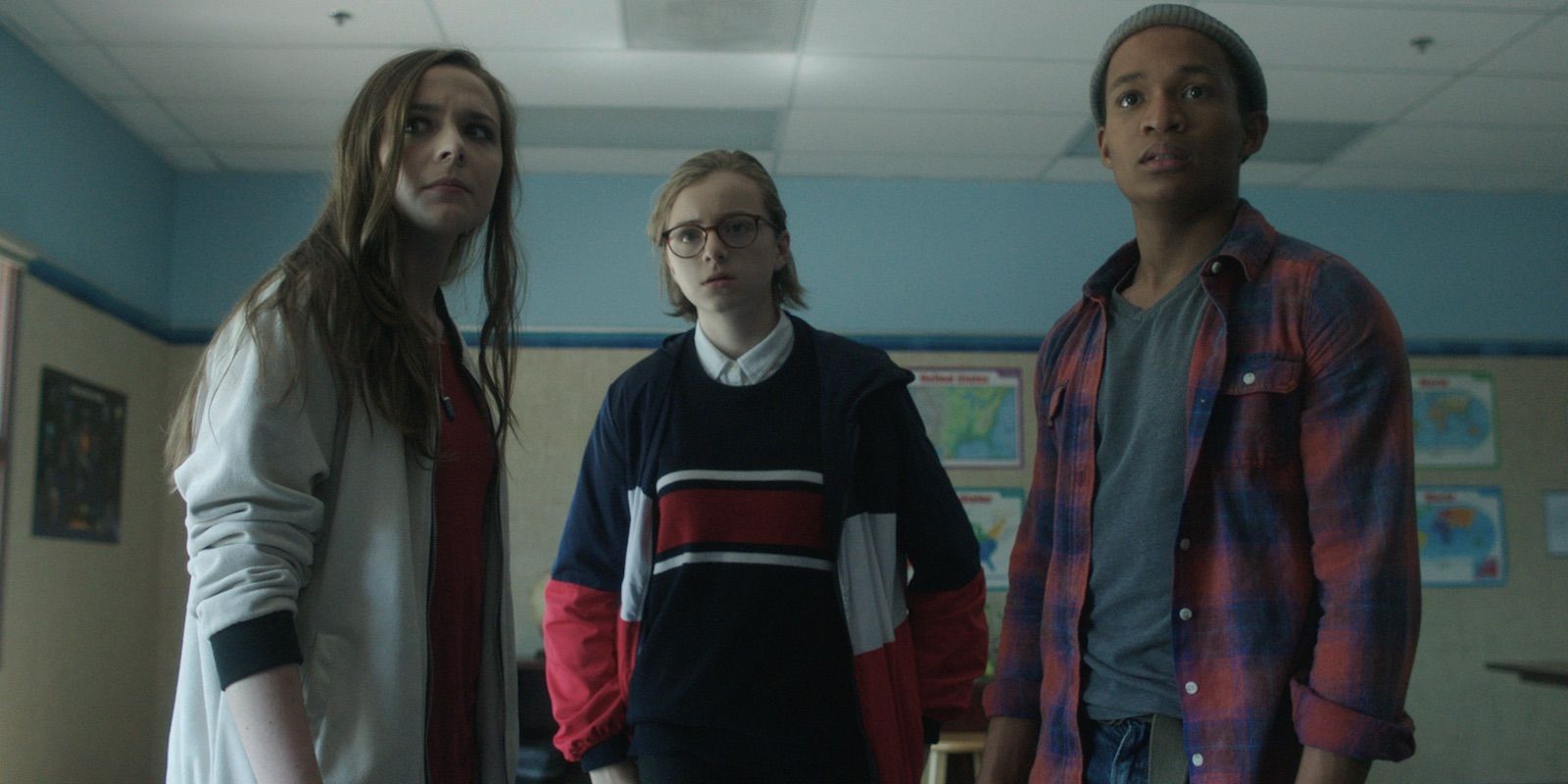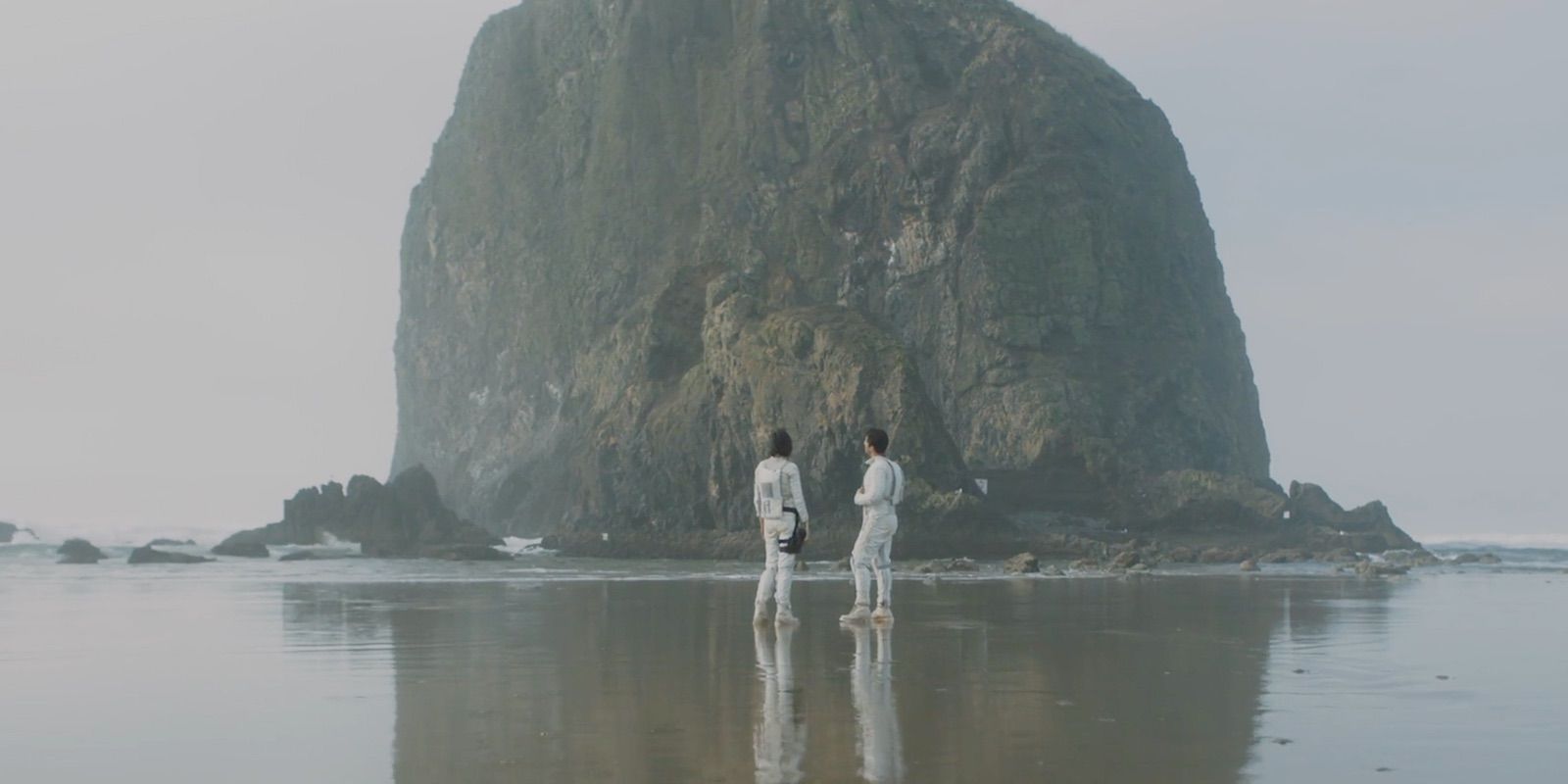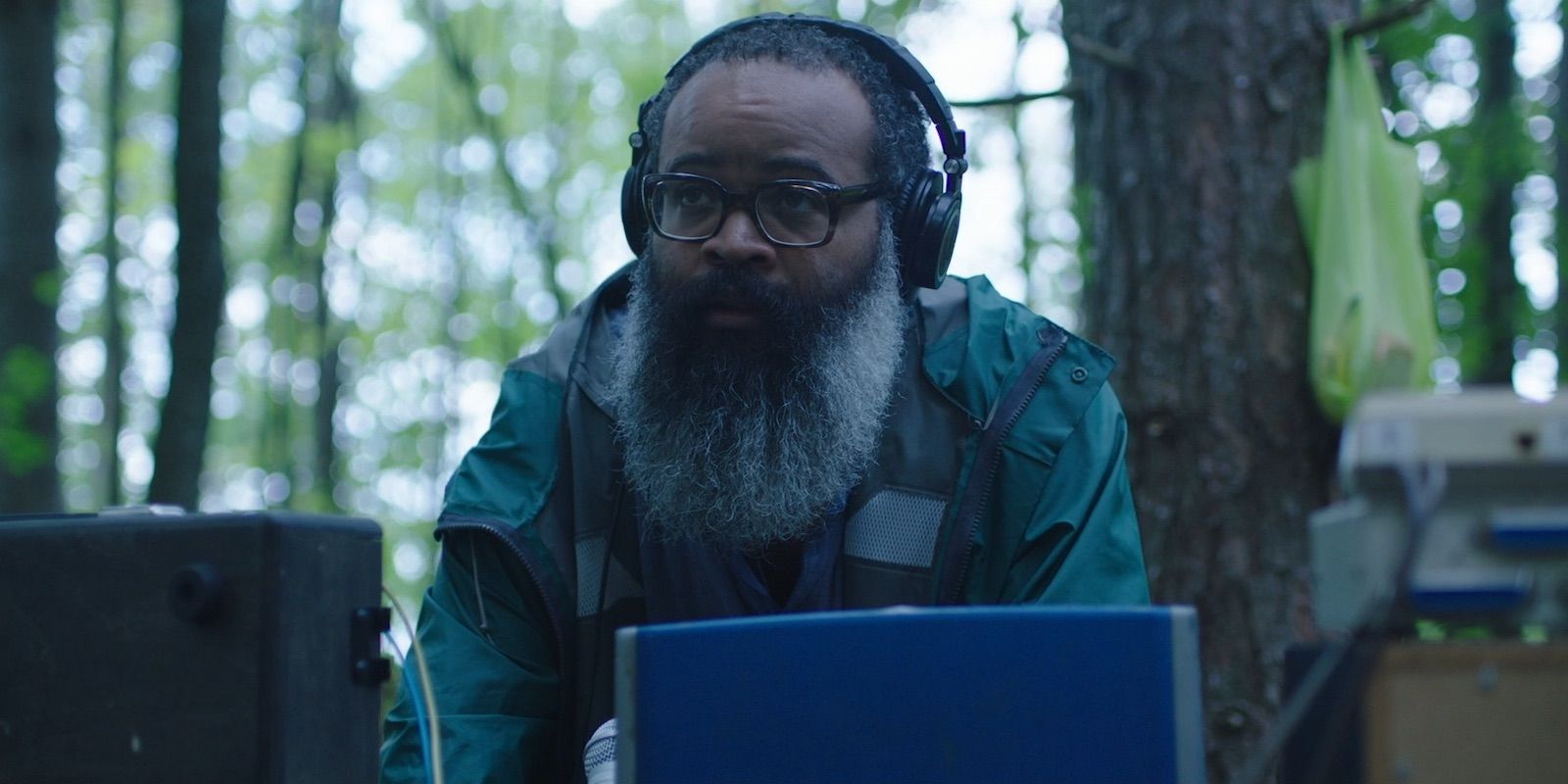
WARNING: The following contains spoilers for Doors, which is currently in select theaters and will be available On Demand on March 23.
The sci-fi movie Doors opens up a whole new world, and in order to explore the vast possibilities, the story is told as an anthology that consists of three segments directed by three different filmmakers: Saman Kesh, Jeff Desom and Dugan O’Neal. Bringing their own unique vision to the fascinating concept of alien doors that mysteriously appear all over the world, each segment approaches the idea from a different angle. In Desom's opening segment "Lockdown," a group of high school students are isolated in their classroom when the doors appear for the first time; in Kesh's middle segment "Knockers," a trio of volunteers venture inside a door to confront a parallel dimension they couldn't have imagined; and in O'Neal's closing segment "Lamaj," a lonely scientist figures out a way to communicate with a door.
In an interview with CBR, the three directors discussed how the anthology film originated, their collaboration on the different segments and what they're most looking forward to audiences seeing when they venture inside the world of Doors.
CBR: How did Doors originate?
Saman Kesh: So Chris White, a producer [who also created Doors], and Brad Miska, another producer, were working on an anthology that had to do with these kind of entities that appear and basically cause people to go to alternate dimensions. And I was brought in, and I pitched them an idea. It was kind of more on the cerebral side, less visceral horror. And after I think about a year, the project kind of turned into that direction more. And after we shot my segment, we wanted to tell an anthology that hung out in that sort of meditative space. And so I think starting in 2017, Dugan, a good friend of mine, he was actually cast in my segment, and then very quickly we just talked about potentially having him [direct] one of the segments. I was a fan of his work and I thought he would bring a unique tone, and that kind of fed into itself. And I said, "Okay, yeah, that's what this anthology is. It's three very different directors exploring the themes of the door and using the door as a through-line, but tonally visiting the material in the ways that are more close to who we are as filmmakers."
Dugan O'Neal: For us, because Jeff and I were brought in after the process was already in motion, it's not like the three of us were like, "Okay, let's do this anthology. You do this one, and I do this." It was a lot more organic than that, like where Saman had already shot his, which I think him and Chris knew that that was going to be the middle [segment], and then we basically had to create the bookends to that. So I came on maybe a year after his film, and then Jeff was a year later. Microbudget filmmaking takes a long time.
But it was cool because to come into a project, especially sci-fi, that already has some of the rules set up -- I mean, I think that's the hardest part about doing sci-fi, especially grounded sci-fi, is coming up with the rules of this world so that the logic works and stuff like that. So I think coming into it and having those kind of constraints, in a good way, was really fun. So I really enjoyed that part.
Jeff Desom: When I came on board, Saman's and Dugan's vision was almost fully fleshed out. I could see those segments and really take my cue from that. So that was a huge advantage that I had.

What was the initial impetus to tackle this idea with an anthology film? Was that baked in from the very beginning or were there other ideas floating around?
Kesh: I mean, that's probably a question for Chris, but I know that him and Brad were interested in working in the space of an anthology, especially with the success of V/H/S. And I think Chris is very much like a parent kind of producer, he loves filmmakers. He geeks out. It doesn't matter how high budget or low budget. He just loves it. And he loves just the hard work that filmmakers put in. And that's just the right space, I think, that he felt we could tell the story.
And I think it's kind of the best place to have younger filmmakers or filmmakers coming up being able to kind of flex because it's not too long -- in this case, the commitment was long, but the commitment normally is shorter. And I think it made sense. I think from my point of view, I felt it was right because it was kind of this holistic view of something that the world was going through. So it felt right to have not just the point of view from the characters' perspectives but point of view of different filmmakers because everybody has their own sort of philosophy of life and existence and their own fears.
It's probably more of an instinctual thing that I'm speaking about. But looking back at it, I think that was the right choice rather than if one of us were to direct all three of these segments, I don't think it would be the same. I think what makes it powerful and unique -- because I think that's what it is: you hang out with one of your friends and you're in a comedy, you hang out with this other friend and it's just drama the whole f*cking time. So it's like having a brain oversee something [and] that tone, that unique personality in their own human genre plays into the story. I think that was always part of it, I don't think we ever felt doing one thing.
At the same time, Saman, you're credited as a writer or co-writer on the other segments in addition to yours. What was the collaboration that resulted from that?
Kesh: Well, I'll give a short little setup and let Dugan and Jeff flesh it out. But basically with Dugan because he was the first one [to come in as another director], we just went back and forth. He had an idea, loved it, we just kind of kept evolving. Dugan was on a project so we'd sometimes not talk for a couple of weeks and then come back. And we just passed a FinalDraft [screenwriting software] file literally back and forth until we were like, "Sick. Times up. Shoot." And with Jeff, we just from the ground up were like, "What would be the coolest way to start this thing?" And we had a lot of different variations, and it was a little bit more talky-talky before we could start writing. But yeah, Dugan and Jeff, please jump in and talk a little bit about it.
O'Neal: I mean, it almost felt you [Kesh] were guiding me, just making sure that we hit certain tropes in a way, because my instinct is never to skew into the horror space. And I think that this being a kind of sci-fi horror, you would sometimes influence certain things, certain scenes to kind of have that tone. And I think it's one of my favorite ways to write is just to send something back and forth because you write something, you think it's good and then all of a sudden [you're co-writer] adds something to it that you didn't think about which gives you an idea and you can build on that. So that was the process is that I sent over a draft and then Saman would do a pass and then I'd do pass, and then you do that however many times until you shoot. So that's how we did it.
Desom: It's very similar, although when I came in I had already the edited cuts of their segments to look at and to really have tonally a very clear cue. And then, yeah, there was Saman to make sure that certain cross-references, like things related to the door, were set up in each episode and set up in my episode that would then later reoccur or be mirrored in their episodes.

The look of the doors, and the look of the title cards that communicate what the doors are saying are very interesting and specific. How was that conceived?
Kesh: When we started, I think all of them were going to be title cards. I've always been influenced by silent movies, even though those aren't my favorite films and I find myself falling asleep in most of them. I do think there is a really weird, omniscient thing when you just cut to black [for a title card], and for better or worse, it does sometimes take you out of the film, and it was just this challenge that I really wanted to tackle. And then I think it just kind of spilled into the other segments. And in Dugan's, we kind of like the idea that the doors became more and more human the more time they spent with humans, so it could actually start to speak. And in Jeff's segment, it's a lot more primitive. It kind of doesn't have full sentences and it's just almost repeating whatever probably the characters are thinking. So there was kind of an evolution.
And tonally, the way the doors would speak had to do with each of the segments as they were mirrors. But I think that definitely was something all of us really liked and all of us had varying opinions of how much, how little. But I think that was something that all of us were interested in because we wanted to anthropomorphize it as much as we needed to because it's also kind of scary when it's suddenly very inhuman. That's what makes it frightening, the moment you think it's human and then it's not human, you're like, "Oh, shit, I forgot. This thing is a weird black wall."
What are each of you most excited for viewers to see in your specific segments?
Desom: I think I'm most excited for people to discover our actors, our cast, because they're young kids. They're all super talented and they're just starting out and they're there to be discovered. And I'm really excited for them, especially.
Kesh: For mine, I think I just really like tapping into things that people, I think, don't day to day think about. And I guess I'm a little bit of a provoke-y guy and I've always been like that since I was a kid, I'd say things that are offensive and I didn't mean them to be offensive but it gets something out of people, so doing it through storytelling is fun. And I think that's the cerebral nature of all of [our segments], all of [our segments challenge], I think, identity and things like that. So I'm excited for people to have little panic attacks and identity crises watching mine.
O'Neal: So for me, […] to have a small cast and more or less one location and have it still feel compelling and a little bit dangerous, I'm really excited for that as a filmmaker, mostly because that's such a challenge. And that was something that I felt like, once we were shooting and I was like, "Wow, we're just here with these characters looking up at this thing," and you get to see the very natural human emotions get stirred up by something that's dangerous -- one's curious and asking questions, the other one's kind of in between and then one's on the more fearful side -- and how those effect that little microcosm. So, I guess that that would be something that I'm curious to see how people respond [to] and [I'm] excited about.

There are a lot of potent themes in the movie. What are you hoping audiences will take away from it?
O'Neal: One thing that I think is interesting throughout, I think it was a very instinctual subconscious thing, but just how the doors are like mirrors, like Saman said. I mean, they kind of give you back what you put into it, which I feel is an interesting way to approach life. If you put out a certain energy or feeling, a lot of times you get those mirrors. So hopefully that can be something that maybe people can identify with […] on a spiritual or philosophical level.
Kesh: I think Dugan said it. I think that's kind of it. Jeff, what do you think?
Desom: No. He said it very well.
What's next? Is there more Doors? Are there other things in the works?
Kesh: All of us are working on our individual projects. As far as Doors, you will have to wait and see.
O'Neal: Anything could happen with the doors.
Kesh: There's millions of them all over the world, so yeah.
Doors starring Josh Peck, Lina Esco, Wilson Bethel, Kyp Malone, Dugan O’Neal, Kathy Khanh, Julianne Collins, Aric Generette Floyd, Rory Anne Dahl, Kristina Lear, Bira Vanara, Bailee Cowperthwaite, Darius Levanté and David Hemphill, is currently in select theaters. It will be available On Demand on Tuesday, March 23 and on DVD/Blu-ray on Tuesday, April 6.
0 Comments